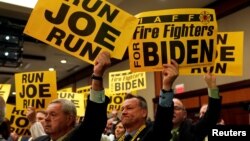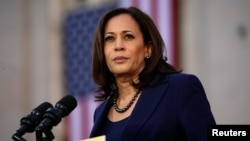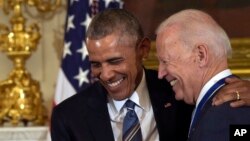When it comes to Joe Biden and his pursuit of the White House, he may have in mind that old saying, “The third time’s the charm.”
Biden continues to edge closer to a run for president in 2020, dropping strong hints an official announcement could come in a matter of weeks.
On Tuesday, Biden got an enthusiastic greeting from members of a firefighters union in Washington, who chanted “Run, Joe, Run!” as he took the stage to speak.
“I appreciate the energy you showed when I got up here. Save it a little longer. I may need it in a few weeks,” Biden told the cheering crowd. He quickly added, “Be careful what you wish for.”
Some Democrats may feel the same way.
WATCH: Biden Hints at Presidential Run
Top of the polls
If Biden gets in the race, he would become the front-runner. He sits at the top of national polls and is either first or second in recent surveys in key early contest states such as Iowa and New Hampshire.
During his speech to the firefighters, Biden also hinted at potential campaign themes.
“Treating people with dignity and respect. Giving everyone a fair shot. Leaving nobody behind. Demonizing no one — not the poor, not the desperate, not the immigrant, not the other.’”
More than a dozen Democrats have jumped in the race, including several candidates who could appeal to the party’s younger and more diverse voters, like California Sen. Kamala Harris, who campaigned recently in New Hampshire.
“The rules are not applying to all people equally in our country,” Harris said. “Not all people in our country have equal access to a path toward success.”
Biden narrowly leads Vermont Senator Bernie Sanders in the latest Iowa poll, and narrowly trails him in the latest survey in New Hampshire.
Iowa and New Hampshire will kick off the presidential primary process early next year. Sanders has embarked on an ambitious campaign tour that included a recent stop in Des Moines.
“Those radical ideas that we talked about four years ago? Well today, virtually all of those ideas are now supported by a majority of the American people.”
The center lane
While much of the energy in the Democratic Party skews to the left, Biden could get competition from other centrists should he decide to get into the race, including John Hickenlooper, the former two-term governor of Colorado.
“It is time to end this American crisis of division. It is time to bring all Americans together, and that is why I am running for president of the United States!” Hickenlooper told supporters at a recent rally in Denver.
Former Texas Congressman Beto O’Rourke, who ran unsuccessfully for Senate in 2018, became the latest candidate to announce a 2020 bid.
As for Biden, the former vice president said at a recent appearance at the University of Delaware that his family wants him to get into the 2020 race.
He also acknowledged he has been engaged in a lengthy period of self-reflection.
“It is something that I have to make sure that I could run a first-rate effort to do this, and make clear where I think the country should go and how to get there,” he said.
Biden’s drawn-out consideration has raised questions among some about his willingness to undertake a grueling campaign.
“It is starting to get later in the game,” Brookings Institution analyst John Hudak said. “And while he does not need to worry about raising his name recognition or challenges like that that some candidates face, it is really time for him to decide to enter, or announce formally that he will not.”
Strengths and weaknesses
Biden would enter the race with two advantages: name recognition and likability. Gallup reported earlier this month that Biden’s national approval rating is 56 percent, and that includes 8 in 10 Democrats, and 1 in 3 Republicans.
A recent Iowa poll found that Biden scored highest on its favorability score at 75 percent. Harris was second with 71 percent, while O’Rourke and Sanders followed with 68 and 67, respectively.
If he runs, Biden would immediately face questions about his age — he’s 76 — and whether his more moderate record as a longtime senator would fare well in a crowded, competitive Democratic field that leans strongly to the left. Some of Biden’s past Senate votes, particularly on criminal justice issues, would come under fresh scrutiny.
Biden would likely counter that his ability to win back white working-class voters in a general election against Trump would be a major asset, especially in key swing states like Michigan, Pennsylvania and Wisconsin. All three states voted for Donald Trump in 2016 after long runs as reliably Democratic in presidential elections.
“Donald Trump may be a polarizing figure nationally, but he is a unifying figure where Democrats are concerned,” said Will Marshall of the Progressive Policy Institute. “They are absolutely united in their determination to not see him re-elected.”
History
Biden has done poorly in two previous presidential bids. He dropped out early in the 1988 campaign after accusations that he had plagiarized speeches from a British politician. He ran again in 2008 but abandoned his campaign after a poor showing in Iowa. He declined to challenge prohibitive favorite Hillary Clinton in 2016 after the death of his son Beau from brain cancer.
Trump has previously slammed Biden in tweets as “weak.” But during his speech at the recent Conservative Political Action Conference, he seemed to suggest he would prefer running against more liberal Democrats, especially those who favor a sweeping environmental proposal known as the “Green New Deal.”
“I want them to embrace this plan. I want them to sell this plan. I just want to be the Republican that runs against them!” Trump said to cheers.
Even though Biden failed in his two previous presidential bids, he remains popular among Democrats after serving as former President Barack Obama’s vice president for eight years.
Biden could also draw inspiration from several vice presidents who eventually were able to win their party’s presidential nomination.
Republican George H.W. Bush and Democrats Hubert Humphrey, Walter Mondale and Al Gore had all run for president before they became vice president but failed to win their party’s nomination.
Then, after serving as vice president, all four went on to win their respective party nomination, though only Bush went on to win the presidency in 1988.







































